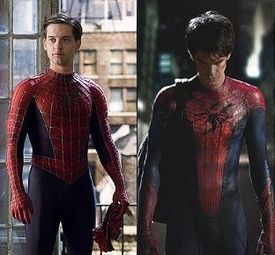Superheroes — A lesson in responsibility
"This guy, Flash Thompson, he probably deserved what happened. But just because you can beat him up doesn't give you the right to. Remember, with great power, comes great responsibility." — Uncle Ben, "Spider-Man"
Today I continue my look at Superheroes, our cultural mythology, with an examination of the core principle of "Spider-Man." In the past ten years, four films have been made featuring this heroic web-slinger. And Spider-Man remains one of the most popular of all superheroes. But it's a myth that also contains an important lesson, one that has some Biblical roots.
Some superhero tales are meant to explain a world view, correct a wrong, or challenge our societal notions. Others are meant to teach us a lesson about our response to the world. Spider-Man falls into the latter category. The myth of Spider-Man surrounds an important idea — how should we respond to evil and injustice in the world, especially when we can do something about it.
This idea isn't new. One of my favorite quotes comes from Edmund Burke, in the 1700s, who said, "All that is necessary for the triumph of evil is that good men do nothing." When we can stand up against evil, we are obligated to do so. Standing by and doing nothing is just as bad as doing something wrong. Or, the idea that if you're not part of the solution you're part of the problem.
Of course, the idea of our responsibility to steward our resources and abilities is a Biblical principle as well. Consider the quote from Uncle Ben that is the foundation of Spider-Man — "with great power comes great responsibility." Sound familiar? It should.
In Luke 12, Jesus talks about shepherding the resources God has given us as we await his return. Luke 12:48 says, "But the one who does not know and does things deserving punishment will be beaten with few blows. From everyone who has been given much, much will be demanded; and from the one who has been entrusted with much, much more will be asked." Sounds pretty similar, right? The ethic that we are obliged to stand up for what is right, to be good stewards of our resources, and to be responsible for that which God has given us.
That is, in essence, the principle and lesson in Spider-Man beginning with the origin story. Peter Parker, a normal teen, is endowed with great skills. He uses those to his own advantage, but then he's presented with an opportunity to use those skills for good. A criminal commits a crime, and Peter can stop him. He chooses not to care and to let the man go.
Later, that same criminal, who Peter allowed to go free, kills his Uncle Ben. This is also ironic since Uncle Ben was the one that tried to teach Peter the lesson about taking responsibility for the power, skills, and abilities he's been given. That painful lesson then sets Peter on the path to becoming Spider-Man and using his skills to help those that need help and to confront evil.
Later in the origin story, Peter restates his mission when he says, "Not everyone is meant to make a difference. But for me, the choice to lead an ordinary life is no longer an option." He has learned his lesson, embraced the ethic his Uncle Ben taught him, and he has stepped into the role of a hero. He is cognizant that with the great power he's been given comes the awesome responsibility of using that power to make the world a better place.
That is also the lesson the audience is to take. We're not super-powered crime fighters, but we can use our skills and talents to make the world a better place. And that is not only what we should do — it is what we MUST do. That is the ethical and moral lesson at the heart of Spider-Man.




Comments
Post a Comment